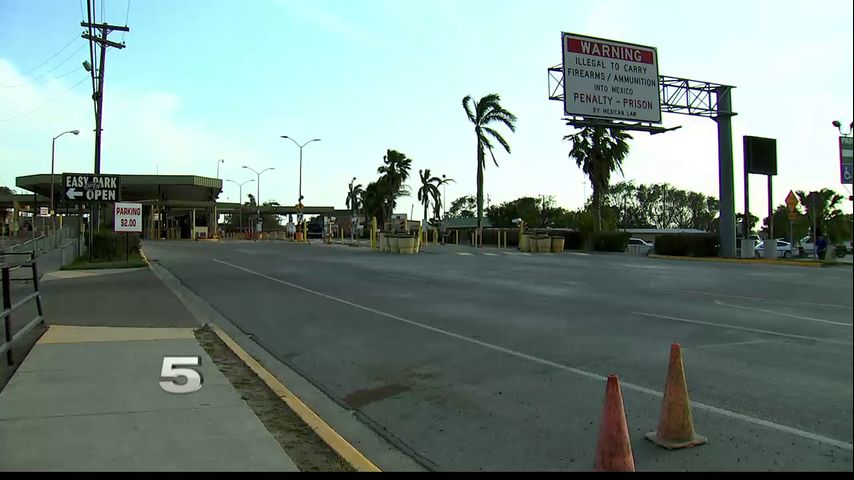Anticipated effects of U.S.-Mexico border partial shutdown
The effects of the partial border shutdown will be felt on both sides of the border, but the weight may be different depending on which side of the boundary people find themselves in.
The last time the Department of Homeland Security closed down the border was following the 9/11 terrorist attacks. Dr. Guadalupe Correa-Cabrera who studies border relations between the U.S. and Mexico cautions against comparing that shutdown with the one prompted by COVID-19 concerns. "We're talking about a world phenomenon, a world problem. We don't know for how long this is going to be happening. This is the problem -- the uncertainty and the time frame," she said.
An air of uncertainty will swiftly move in at midnight on Friday after the bridge is closed for non-essential travelers.
Essential travel is defined by the DHS as:
- U.S. citizens and lawful permanent residents returning to the United States;
- Individuals traveling for medical purposes (e.g., to receive medical treatment in the United States);
- Individuals traveling to attend educational institutions;
- Individuals traveling to work in the United States (e.g., individuals working in the farming or agriculture industry who must travel between the United States and Mexico in furtherance of such work);
- Individuals traveling for emergency response and public health purposes (e.g., government officials or emergency responders entering the United States to support Federal, state, local, tribal, or territorial government efforts to respond to COVID-19 or other emergencies);
- Individuals engaged in lawful cross-border trade (e.g., truck drivers supporting the movement of cargo between the United States and Mexico);
- Individuals engaged in official government travel or diplomatic travel;
- Members of the U.S. Armed Forces, and the spouses and children of members of the U.S. Armed Forces, returning to the United States; and
- Individuals engaged in military-related travel or operations.
Non-essential travel is classified as Individuals traveling for tourism purposes (e.g., sightseeing, recreation, gambling, or attending cultural events). It's those kinds of daily runs that keep the economy running, said Dr. Correa-Cabrera. "People go to the other side. They go to eat, they go to have a drink, and they consume. That moves the economy. It's not just tourism -- people who travel for a long time -- but short-term interactions, or travel," she said.
On the U.S. side of the border, Congressman Henry Cuellar, District 28, was fielding questions from the private sector as soon as news broke Friday morning. He said, "Trade is not going to stop -- $1.7 billion dollars every day. So, any person related to trade is going to continue. That's important."
The United States, Mexico and Canada all agree to keep from disrupting the supply chain running up and down the international bridges. Just in 2018, the Valley ports of entry totaled about $35.4 billion dollars in direct trade, according to the Texas Comptroller's Office. The impact is expected to fall on the regional economies. U.S. lawmakers are anticipating that by passing the Families First Act and the stimulus package currently still in the works. These will help small businesses, employees out sick and personal incomes.
On the Mexican side, repercussions to the individual's budget could hit harder. Correa-Cabrera is concerned about the Mexican economy and its ability to take such an unprecedented blow. "Mexicans will have a greater impact of all this because of the partial closure of the U.S./MX border," she said.
Congress is already back home from D.C., but they'll be expected to go back to D.C. soon and vote on a way to move the country forward. In that regard, there may be some good news, according to Congressman Cuellar. He says, "I'm glad people are not putting their party hats, Democrats or Republicans. They're saying 'we're Americans and let's find a solution.'"
The border will remain open to travelers allowed and screened by Customs and Border Protection. They sent a statement describing how they will determine who can pass through the border:
"Ports of entry (POEs) will permit entry of legitimate documented travelers not subject to previously announced travel restrictions and who present proper documentation for essential travel only and may limit the number of open vehicle primary lanes to maintain operational control of all travelers seeking entry to the United States. Restricted travelers will be returned to their last point of origin (Mexico or Canada) and CBP will suspend case processing of inadmissible individuals, to include those subject to travel restrictions pursuant to Section 212(f) of the INA."
"In between POEs, Border Patrol agents will be given tools necessary to identify aliens at the border and to adjudicate some cases in the field at initial encounter. This will enable our agents to rapidly make a decision whether to take someone into administrative custody, or to send them without any further Title 8 processing to the nearest Port of Entry to expel them to Mexico or Canada."
"The border is not closed, but access is being limited to prevent the further introduction of COVID-19 into the United States. This is an unprecedented response due to an unprecedented situation."




